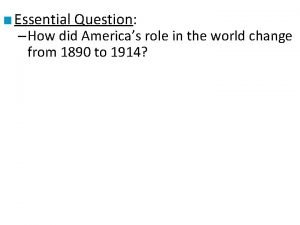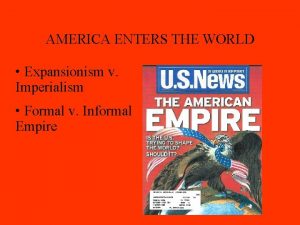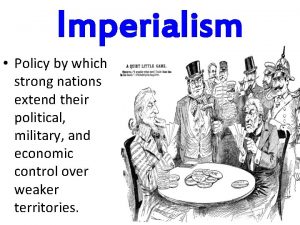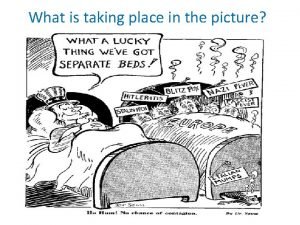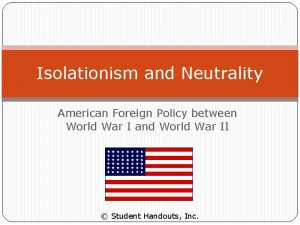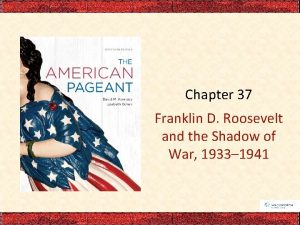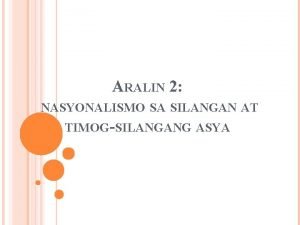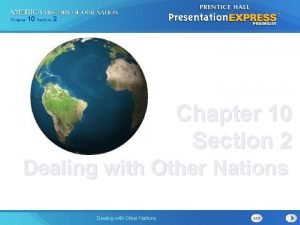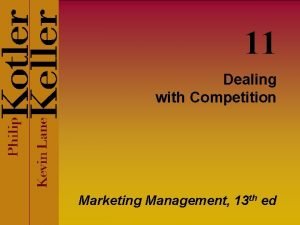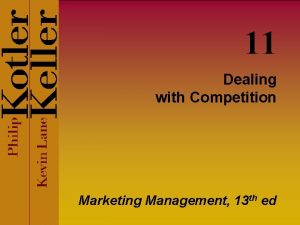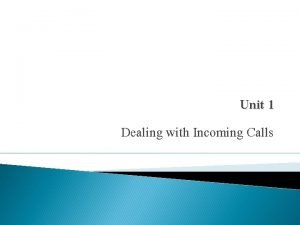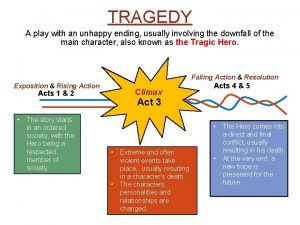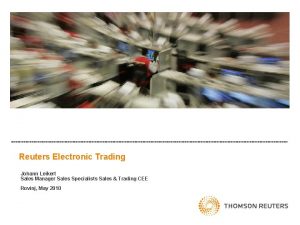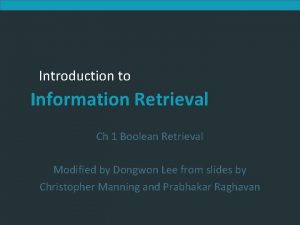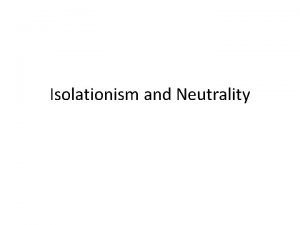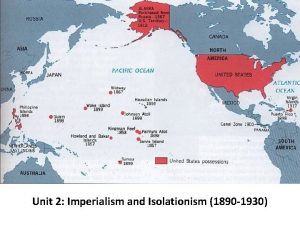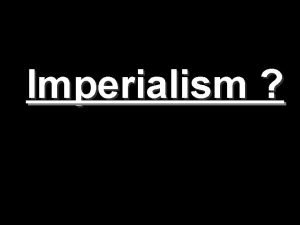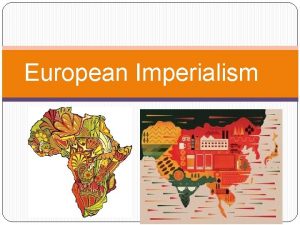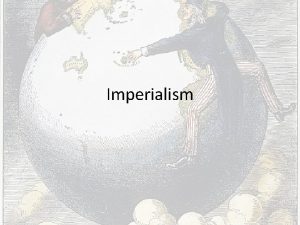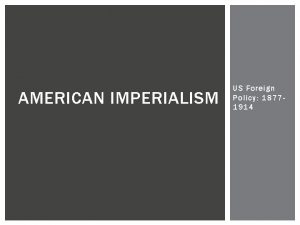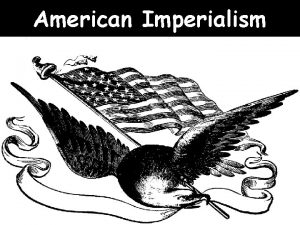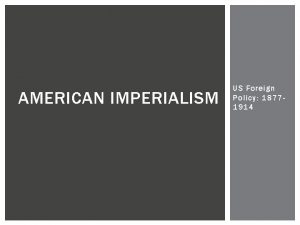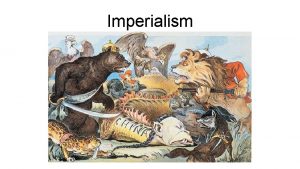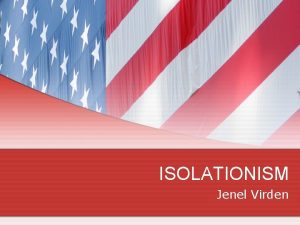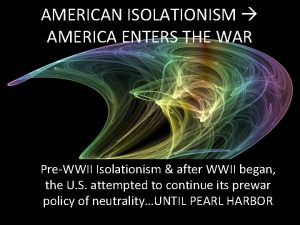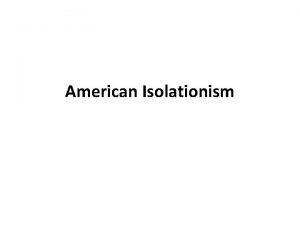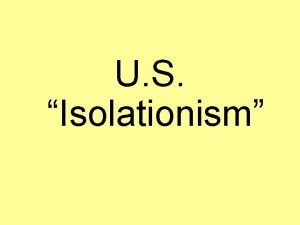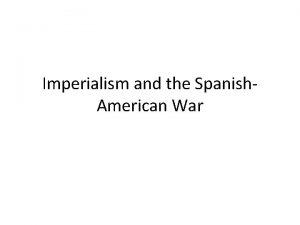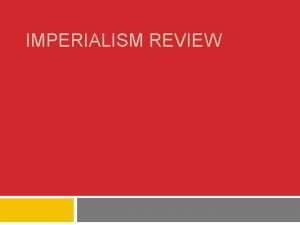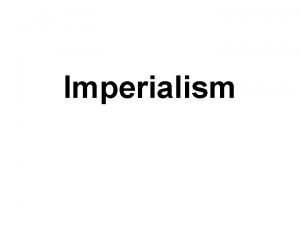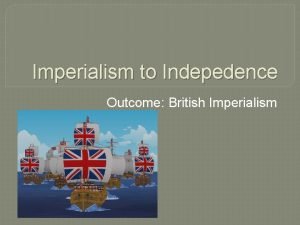Isolationism and Imperialism ISOLATIONISM Policy of dealing with






























- Slides: 30

Isolationism and Imperialism

ISOLATIONISM • Policy of dealing with foreign countries • Staying out of world affairs • Using barriers to control trade • U. S. policy until late 1800 s

Why be Imperialistic? • Continue Manifest Destiny / expansion • Mainland N. America conquered • Desire to be world power

IMPERIALISM • the policy in which stronger countries extend their economic, political or military control over weaker territories. • Became U. S. foreign policy in late 1800’s

IMPERIALISM - Where • European countries had been carving up other countries for years. • • • Central American Latin America Caribbean Pacific and Asia Africa

IMPERIALISM – How • Nations had – Stronger military – Wanted natural resources • Government intervention • Purchase territory - Alaska 1867

IMPERIALISM – Who • 10 Imperial Powerful Countries ØG. Britain ØFrance ØGermany ØItaly ØJapan ØSpain ØPortugal ØNetherlands ØRussia ØUnited States How do these Imperial countries relate to WW I ?

5 Factors that fueled Intervention / American Imperialism: 1. Economic Competition - Industrial Rev. brought new products - need for raw materials - favorable balance of trade (exporting more than importing)

2. Political Reasons - recognized as a world power - build a bigger empire (measures greatness) - to protect investments

3. Military Competition - needed to compete with other nations - national security protect investments, resources & colonies - advantage over other countries navy (new) * fueling stations in Pacific

4. Racial / Cultural Superiority - English descendants believed they were superior - Social Darwinism > survival of the fittest - their duty to civilize the rest of the world

5. Religious Reasons - belief Christianity was superior - needed to spread to Asia & Africa - missionaries encouraged Imperialism - Social Darwinism (superior religion)


Negative Points of Imperialism • Country develops a superior attitude • Reputation as a bully • Our history - were a colony • Cost involved • Enough work to be done at home - America large - don’t spread resources to thin

Anti-Imperialism • Against America becoming imperialistic • Saw as a threat to American values • Democracy should not control others without their consent • High cost of maintaining army/navy • Would take jobs from American workers

Spanish American War • Reasons the U. S. gets involved – expanding capitalism / new markets – protect investments – sympathy for support Cuban independence – Monroe Doctrine – yellow journalism


Spanish American War • Cuba (colony of Spain) - Cuba had been fighting for independence - U. S. had big investments in Sugar • Yellow Journalism - exaggerated news information • U. S. S. Maine - exploded in Havana - media blames Spain

Spanish American War • Results - Treaty of Paris gain territory in Philippines, Guam, P. Rico - U. S. more involved in Latin America - Platt Amendment gave U. S supervision over Cuban affairs gave right to lease military base (Guantanamo Bay)


Latin America • Roosevelt Corollary - amendment to Monroe Doctrine - gave U. S. right to intervene if countries could not repay debts or to stabilize the economic affairs - in Caribbean & Central America * Teddy Roosevelt’s “Big Stick” Policy



Foreign Policy with L. America • The Panama Canal - TR wanted to shorten trade route - supported Panama Revolution (for our own gain of land access) - U. S. gained rights to build a canal - Benefits U. S. trade and military

Latin America cont. • Taft’s Dollar Diplomacy - economic - promise to protect the investments of American businesses in L. America - increased U. S. control & influence in L. America • Wilson’s Moral (Missionary) Diplomacy - moral - used to intervene in MX. - moral obligation to promote democracy - supported economic interest of U. S. businesses in western hemisphere

Foreign Policy with Asia • Open Door Note / Policy - 1899 - China weak due to war - European countries moving in / fear of China getting carved up - issued to open trade with China - wanted a piece of the sphere of influence - lead to more econ. opportunities for the U. S.


Map of China Cartoon

Problems in the Philippines • Filipino rebels fought alongside U. S. soldiers against the Spanish during the Spanish-American War • The Philippines wanted to become an independent nation • U. S. fails to grant the Philippines independence after the war

• U. S. -Filipino fighting breaks out in 1899 and continues for years • Philippines didn’t gain independence until 1946
 Old imperialism motives
Old imperialism motives Africa 1890
Africa 1890 Foreign policy imperialism
Foreign policy imperialism Foreign policy imperialism
Foreign policy imperialism Queen liliuokalani
Queen liliuokalani Isolationism picture
Isolationism picture Isolationism definition u.s. history
Isolationism definition u.s. history Storm cellar isolationism
Storm cellar isolationism Nasyonalismo sa korea
Nasyonalismo sa korea Expansionist synonym
Expansionist synonym Chapter 5 lesson 1 dealing with anxiety and depression
Chapter 5 lesson 1 dealing with anxiety and depression Chapter 5 lesson 1 dealing with anxiety and depression
Chapter 5 lesson 1 dealing with anxiety and depression Branch of linguistics dealing with meaning
Branch of linguistics dealing with meaning Biotic
Biotic Section 2 dealing with other nations
Section 2 dealing with other nations Dealing with call center stress
Dealing with call center stress Dealing with competition in marketing
Dealing with competition in marketing The genre of speculative fiction dealing with concepts
The genre of speculative fiction dealing with concepts Dealing with competition marketing management
Dealing with competition marketing management Unit 1 dealing with incoming calls
Unit 1 dealing with incoming calls Dealing with anger in the bible
Dealing with anger in the bible Dealing successfully with difficult changes in your life
Dealing successfully with difficult changes in your life Lexicological unit
Lexicological unit Works written by shakespeare often have an unhappy ending
Works written by shakespeare often have an unhappy ending Dealing with unstructured data
Dealing with unstructured data Reuters electronic trading
Reuters electronic trading Dealing with unstructured data
Dealing with unstructured data The branch of zoology dealing with insects
The branch of zoology dealing with insects The branch of zoology dealing with insects
The branch of zoology dealing with insects Dealing with challenging patients
Dealing with challenging patients Dealing successfully with difficult changes
Dealing successfully with difficult changes


